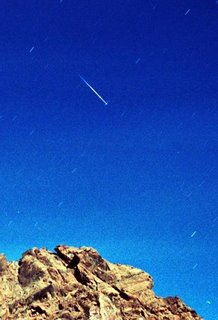
How did life begin on earth? A fragment of a meteorite found in Canada may hold the clue. This
from the CBC:
A meteorite that crashed in northwest Canada almost seven years ago might have been able to host the very earliest life forms, according to NASA researchers, which opens the door to the possibility that life could be present elsewhere in the universe.
Mike Zolensky, a cosmic minerologist at the NASA Space Centre in Texas, told CBC Radio the Tagish Lake meteorite is unlike any they have ever examined.
"We always knew it was a rare, very carbon- and water-rich meteorite — and they hardly ever fall on the Earth," said Zolensky. "But we've found since that it's even more unique than that. It's a totally unique meteorite."
Zolensky said tiny bubbles in the rock are organic globules where the universe's earliest life forms could have been able to live, an astonishing discovery from a meteorite thought to be 4.5 billion years old — older than the Earth.
"Perhaps these are like little condos arriving on earth and biology can move in later on," said Zolensky.
"They've survived somehow, intact on an asteroid for over four and a half billion years and where they come from, we don't know. But it's not from around here. It's from somewhere else."
Scientists have speculated life on earth began somewhere between 3.5 and 3.9 billion years ago.
The meteor first attracted attention when a dramatic fireball lit up the early morning skies of the Yukon, northern British Columbia, parts of Alaska, and the Northwest Territories on Jan. 18, 2000.
 How did life begin on earth? A fragment of a meteorite found in Canada may hold the clue. This from the CBC:
How did life begin on earth? A fragment of a meteorite found in Canada may hold the clue. This from the CBC:
1 comment:
Fred Hoyle has theorized that comets may have brought the beginnings of life to our planet but perhaps meteorites played a role. Either way the analogy to an egg being fertilized by sperm is quite obvious. As above, so below. . .
Post a Comment